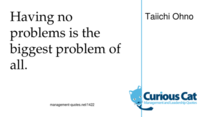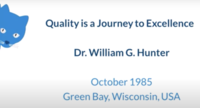Posts selected fromManagement Blog - Engineering Blog - Investing Blog and other blogs - Psychology – Managing Human Systems
People are not cogs in a machine. Everyone brings extraordinary talents and abilities to the organization. Dr. Deming sought to maximize the value people bring to the organization. This requires giving them pride in their work, freedom to use their brain, tools to be effective and systems that allow people to practice continual improvement.
Creating an environment where people flourish is key to Deming’s thinking. Deming understood what John McGregor put forth in the Human Side of Enterprise (1960) that people have an innate desire to take pride in what they do. Management’s job was to allow people to fulfill this need, not to attempt to manipulate behavior through external motivation. continue reading: Psychology – Managing Human Systems - Toyota Execution Not Close to Being Copied
- Cool Workspaces
 - Shared Principles for Managing People Engaged in Diverse Tasks
 ...I do agree that the system within which people are operating determines how they must be managed. There are definitely features of software development that are significantly different than manufacturing scalpels or basketballs or tables. As there is a difference between a surgical team in an operating room, road construction, mining, editing books, investment banking, manufacturing industrial robots, researching new drugs, manufacturing drugs, teaching in a university, maintaining plane engines, coaching an athletic team...
I see universal principles of management (respect for people, customer focus, continual improvement...) that cross all different human enterprises. How those principles should be manifest in a particular situations depend on the work being done, the management system that is in place, the individual people involved, the specific focus of the effort right now... The way those principles are manifest will look very different in all the varied types of organizations we create and the different work and processes used within those organizations.
... continue reading: Shared Principles for Managing People Engaged in Diverse Tasks - Iterative Customer Focus
Like many of Deming’s ideas the idea of iterative customer focus can seem too simple to be very powerful. But in fact that idea is extremely powerful. Those familiar with agile software development can see the idea of delivering working software quickly and iterating based on actual customer use illustrated in Dr. Deming’s “new way” iterative cycle shown in his paper published in 1952.
The importance of learning about non-users is something that still today is often overlooked...
I have written about importance of customer focus to Deming’s ideas in several previous blog posts, including: Customer Focus with a Deming Perspective, User Gemba and the most important customer focus is on the end users. continue reading: Iterative Customer Focus - People are Our Most Important Asset
ideally the organization would be providing all employees excellent coaching opportunities, all employees would be paid more than fairly, all employees would have the opportunity to develop along their desired plan, all employees would have great leadership, all employees would not be subject to continually annoyance of management system failures, all employees could count on the support of the system when needed…
But in organizations that I have worked for we are have not reached that point. So while working to move the organization closer and closer to that goal, I believe making some extra effort to focus on those people that are helping move the organization in that direction. But it is risky if done without an understanding of systems, variation, psychology, etc. Providing extra coaching, advice and attempting to protect people from the management failures you can’t get fixed seem like pretty safe methods. continue reading: People are Our Most Important Asset - Bring Me Solutions Not Problems
 What they are saying is: if you know of a problem but don’t know of a solution I would rather we continue to have that problem than admit some of my staff don’t know how to fix it (and then have to deal with it myself – maybe then having to accept responsibility for results instead of just blaming you if I am never told and there is a problem later…). I think that is setting exactly the wrong expectations.
Employees should fix things. They should bring solutions to managers to improve things that might be out of their ability to fix. But if they know of a problem and not a solution and a manager tells the employee they don’t want to be brought problems then I don’t want that manager. continue reading: Bring Me Solutions Not Problems - Factfulness – The Importance of Critical Thinking
 I have come to see a willingness to value critical thinking, even when it means forcing the organization to address tough issues, as one the differences between organizations that succeed in applying management improvement methods and those that fail. In many organizations that fail, more weight given to making things easy for your bosses versus continual improvement in providing value to customers (which often requires challenging existing processes, beliefs and power structures in the organization).
Challenging the status quo is difficult and most organizations prefer to maintain a culture that takes an easier path. Management improvement often requires a willingness to encourage challenges to the status quo. The importance of challenging the status quo in your organization and in your own thinking is under appreciated. continue reading: Factfulness – The Importance of Critical Thinking - Leading The Transformation Process
Transformation starts with the individual but as they change they can run into organizational barriers and resistance to change. Similarly if the organization institutes changes without helping people change their own understanding and views those people resist the changes in the organization.
Deming’s management system provides a view of the organization as a system, including the people in that organization, and ideas for how to manage the transformation as an integrated system. The interactions between the components of the system and people must be considered and managed to transform. And those interactions continually change as the overall system evolves.
continue reading: Leading The Transformation Process - Are Google Management Practices Worth Studying?
Larry Dignan asks “Is Google reinventing corporate management or just living off the fruits of one big breakthrough?” Well, I believe Google offers a great deal for managers to study – see our posts on Google management practices. But that is not the same as reinventing corporate management. Most companies have no way of just replacing their management system with a “Google management system” – they don’t have the managers to make it work, or the staff or the systems or maybe even the business… However there is plenty that can be learned and adopted. continue reading: Are Google Management Practices Worth Studying? - Quality is a Journey to Excellence
 I recently uncovered this 2 day management seminar that Bill Hunter (my father) recorded in 1985 in Green Bay, Wisconsin. The embedded clip shows the first section of a the seminar.
The present system in the US has not provided for any meaningful contribution from the workers themselves to improve the methods of production and the quality of work life. They have no opportunity to exercise their judgement, imagination, creativity or versatility in ways that could contribute to their productivity and sense of dignity. It is no surprise that they undergo frustration and discouragement, feelings certainly not apt to contribute to their efficiency. The solution to our productivity problem is the necessity for management and labor to recognize the intrinsic value of the human being.
Russell Schrader continue reading: Quality is a Journey to Excellence - A Good Management System is Robust and Continually Improving
A good management system doesn’t rely on heroic efforts to save the day. The organization is designed to succeed. It is robust. It will succeed with all the variation thrown at it by the outside world. A good management system takes advantage of the contributions people offer, but it will not perform poorly when others are relied on. continue reading: A Good Management System is Robust and Continually Improving - Executives Again Treating Corporate Treasuries as Their Own Money
A huge problem with current practices at American companies is that senior executives believe they personally are due what the company earns. The repeated ethical lapses perpetrated by the senior executives and supported by their well paid board continue to undermine the economy of the country... continue reading: Executives Again Treating Corporate Treasuries as Their Own Money - Toyota’s Commitment
The Toyota Way is a management philosophy involving 14 principles that is the essence of the DNA of our organization and really all those who make up the company. In its basic form, the Toyota Way boils down to two fundamental practices: Respect for People and Continuous Improvement.
continue reading: Toyota’s Commitment - Losses Covered Up to Protect Bonuses
Does it surprise you to learn traders would cover up losses to protect bonuses? It shouldn’t, it happens over and over. Would it surprise you that almost any bonus (or quota) scheme increases the odds that the data will be doctored to meet the goals? It shouldn’t. Intelligent measures to make such doctoring difficult can help reduce the practice. But it is a likely risk of any such goal.
As we have quoted Brian Joiner as saying: there are: “3 ways to improve the figures: distort the data, distort the system and improve the system. Improving the system is the most difficult.” So it is no shock that distorting the data is often the tactic people use (especially when the rewards are great or the punishment for missing is severe). continue reading: Losses Covered Up to Protect Bonuses
|